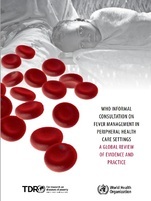Patients with fever need better diagnosis and appropriate treatment
26 November 2013

Many people who visit health clinics with fever in malaria endemic areas do not have malaria, but they still receive antimalarial drugs. A new report from the World Health Organization makes recommendations on how to best manage non-malarial causes of fever.
The wider use of rapid diagnostic tests has helped improve detection of malaria. Since 2010 the WHO recommends that all patients suspected of having malaria should be tested before treatment.
But when the test is negative, clinicians often don’t know what diseases are causing the symptoms. Many patients are treated with antimalarial drugs, and many receive antibiotics which are thought to be prescribed unnecessarily.
In order to use antimalarial and antibiotic medicines rationally, patients and health workers need access to better diagnostic testing. Health workers also need training and adequate equipment so that they can provide accurate diagnosis and proper treatment to patients who have tested negative for malaria.
Understanding non-malaria causes of fever
The new expert consultation report, entitled 'WHO informal consultation on fever management in peripheral health care settings: A global review of evidence and practice', makes several recommendations.
These include carrying out research studies in different regions and at different levels of health care to better understand the causes of fever. Some of the causes could be gastroenteritis, urinary tract infections, dengue, digestive infections and fever associated with immunity problems caused by HIV.
The WHO also recommends that programmes promoting the standardised instructions to manage fever in children and adults should include guidance on diagnosis and treatment for patients who test negative for malaria.
ACT Consortium experts involved in WHO report
The publication presents conclusions of a technical meeting held in January by the WHO Global Malaria Programme and the Special Programme for Research and Training in Tropical Diseases. It comes at a time when non-malaria causes of fever are increasingly important as the number of malaria cases decreases.
The director and deputy director of the ACT Consortium, Professor David Schellenberg and Dr Shunmay Yeung participated in the meeting, as well as Consortium members Dr Hugh Reyburn and Dr Anders Björkman who are leading research studies in this subject.
Further information
- Download the report: WHO informal consultation on fever management in peripheral health care settings: A global review of evidence and practice
- Watch our video about the ACT Consortium project to identify non-malaria illnesses that cause fever
- Read more about our research into causes of fever in children under five in Zanzibar

